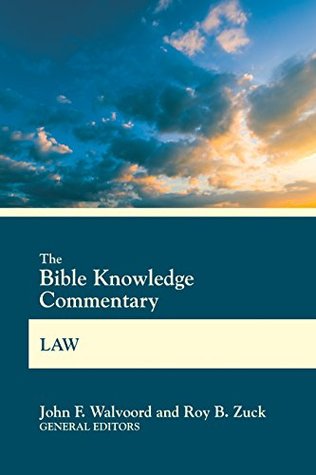- Bible
- Read the Bible
- Bible Versions
- Verse of the Day
- Reading Plans
- Verses by Topic
- Books of the Bible
- Bible Images
- Study
- Commentaries
- Concordances
- Dictionaries
- Encyclopedias
- Sermons
- Bible Atlas & Maps
- BP Wiki
- Devotionals
- Today's Devotionals
- Light of the World
- All Devotionals
- Inspirational Quotes
- More
- Picture Quotes
- Videos
- Inspirational
- Bible Study
- What The Bible Says
- Bible Q&As
- Daily Bread
- Bible by Genre
- Bible Stories
- Random Bible Verse
- Community
- Store
The Bible Knowledge Commentary Law
by John F. Walvoord
From Creation to Our Story Today
The first five books of the Bible—known as the Pentateuch or the Law—form the foundation for our heritage, our faith, and relationship with God today.
In this detailed, highly researched exploration of Genesis, Exodus, Leviticus, Numbers, and Deuteronomy, Dallas Theological Seminary professors help us understand the theological and historical context for the first five books of the Bible. From creation to the Ten Commandments to the beautiful reminders to follow God’s ways, the biblical books of law offer us rich insight into how to live well in today’s world.
From Creation to Our Story TodayFrom Creation to Our Story TodayThe first five books of the Bible—known as the Pentateuch or the Law—form the foundation for our heritage, our faith, and relationship with God today.
In this detailed, highly researched exploration of Genesis, Exodus, Leviticus, Numbers, and Deuteronomy, Dallas Theological Seminary professors help us understand the theological and historical context for the first five books of the Bible. From creation to the Ten Commandments to the beautiful reminders to follow God’s ways, the biblical books of law offer us rich insight into how to live well in today’s world.
The first five books of the Bible—known as the Pentateuch or the Law—form the foundation for our heritage, our faith, and relationship with God today.
In this detailed, highly researched exploration of Genesis, Exodus, Leviticus, Numbers, and Deuteronomy, Dallas Theological Seminary professors help us understand the theological and historical context for the first five books of the Bible. From creation to the Ten Commandments to the beautiful reminders to follow God’s ways, the biblical books of law offer us rich insight into how to live well in today’s world.
BUY NOW
Kindle Edition, 336 pages
Published March 1st 2018 by David C. Cook
© 2025 Bibleportal.com All rights reserved.

John F. Walvoord (May 1, 1910 - December 20, 2002) was a Christian theologian, pastor, and president of Dallas Theological Seminary from 1952 to 1986. He was the author of over 30 books, focusing primarily on eschatology and theology including The Rapture Question, and was co-editor of The Bible Knowledge Commentary with Roy B. Zuck. He earned AB and DD degrees from Wheaton College, an AM degree from Texas Christian University in philosophy, a ThB, ThM, and ThD in Systematic theology from Dallas Theological Seminary, and a LittD from Liberty Baptist Seminary.
In addition to his responsibilities at the seminary, Walvoord earned a reputation as one of the most influential dispensational theologians of the twentieth century and played a prominent role in advocating a rapture of Christians from the earth prior to a time of great tribulation, followed by a literal thousand-year millennial reign of Christ, and a renewed focus of God on the nation of Israel as distinct from the church.
... Show more